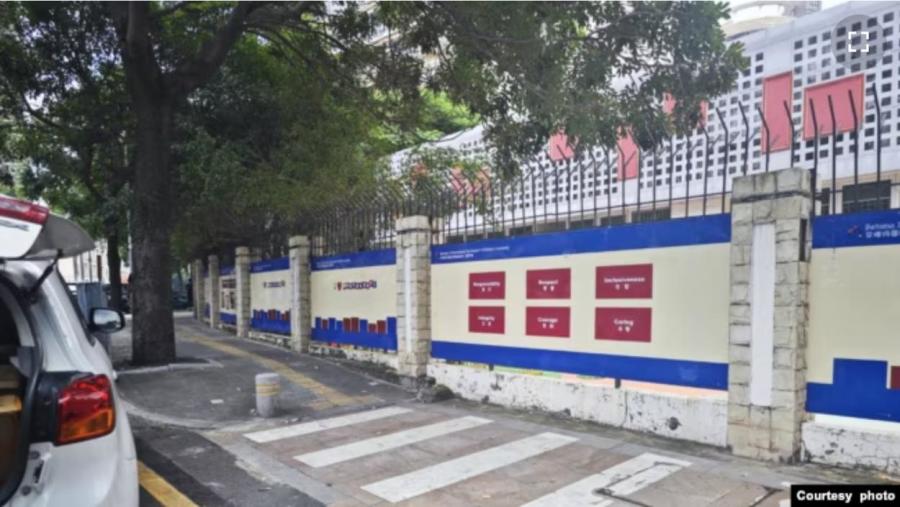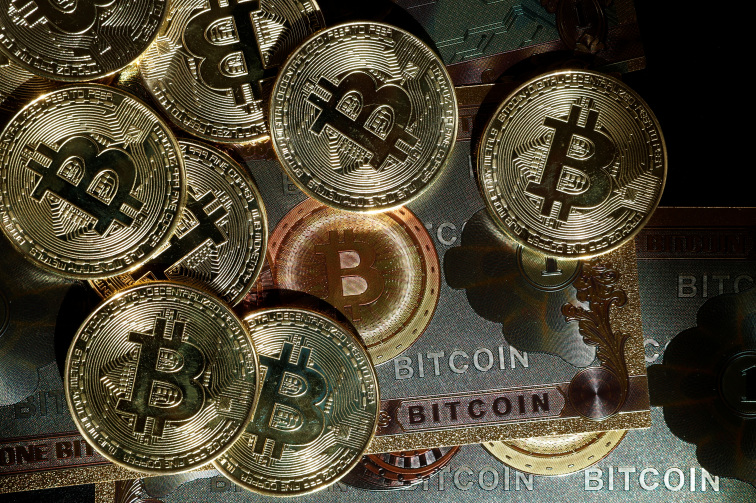Shenzhen Japanese School Exterior. On September 18, 2024, a 10-year-old Japanese boy was fatally attacked with a knife while on his way to school. (Photo provided by interviewee "A", September 20, 2024 / VOA)
[People News] This Friday, the Shenzhen Intermediate People’s Court sentenced the Chinese perpetrator responsible for last September’s fatal attack on a Japanese boy in Shenzhen to death. While international media, such as Japan’s Kyodo News, reported the case, Chinese domestic media have remained almost entirely silent. What lies behind this?
According to Radio Free Asia, citing reports from Japan’s Kyodo News and Hong Kong’s Oriental Daily, the Shenzhen Intermediate People’s Court sentenced the accused, a 45-year-old Chinese man named Zhong Changchun, to death on January 24 for intentional homicide. The Japanese boy killed in Shenzhen was just 10 years old at the time.
The related report is based on information revealed to the media by Kenji Kanasugi, the Japanese Ambassador to China.
Court Bans Media from Attending Public Trial
The court ruling stated that the accused purchased a knife and killed the child to gain online attention. However, the judgment did not mention "Japan" nor specify whether the attack was particularly targeted at Japanese nationals.
Reports indicate that before the trial, many Japanese journalists gathered outside the court, which was under heavy security, including helicopters patrolling overhead. Although the case was categorized as a public trial, it was not open to media. Japanese Consul General in Guangzhou, Yoshiko Kijima, was present in court. It is reported that during the trial, the defendant expressed a desire to say something to the victim’s family and the Japanese embassy in China.
This case occurred on September 18 last year, the anniversary of the "Mukden Incident" (September 18 Incident), which marked the beginning of Japan’s invasion of China. At the time of the incident, the 10-year-old Japanese boy, a student at the Shenzhen Japanese School, was stabbed by a stranger on his way to school. He was rushed to the hospital but succumbed to his injuries the following day. The Chinese Ministry of Foreign Affairs emphasized that the stabbing incident was an "isolated case."
On the day before the sentencing (January 23), the Suzhou Intermediate People’s Court delivered a verdict in another case involving an attack on Japanese nationals. The court sentenced 52-year-old Chinese man Zhou Jiasheng to death for intentional homicide in a 2024 incident.
Radio Free Asia previously reported that this violent attack in Suzhou caused three casualties, including the death of a Chinese bus attendant, Hu Youping, who tried to intervene. The court’s ruling disclosed that Zhou Jiasheng acted out of despair due to debt and unemployment, leading him to commit an extreme act of societal revenge. However, the judgment did not link his motive to targeting Japanese nationals. Nonetheless, some public opinion suggests that both cases—this one and the Shenzhen incident—may involve hate crimes against Japanese individuals.
Chinese Media Silence and No Comment from the Foreign Ministry
Both cases have drawn significant attention from the public in China and Japan. However, a search by Radio Free Asia reporters revealed that aside from reports by several international and Hong Kong media outlets, mainland Chinese media has scarcely covered the Shenzhen court’s verdict on Friday.
At the Chinese Foreign Ministry’s regular press conferences on January 23 and 24, reporters from Reuters and Japan’s Kyodo News asked repeatedly about the trials of these two cases, seeking comments from the Chinese side. In response, Chinese Foreign Ministry spokesperson Mao Ning gave nearly identical replies: “This case has entered judicial proceedings, and Chinese judicial authorities will handle the matter according to law.” She also stated that China will “continue to take measures to protect the safety of foreign nationals in China.”
Netizens: Deliberate Avoidance Reflects Concern Over Public Sentiment
Commenting on the official response to the Suzhou case, the public account “Mr. Wang’s After-Dinner Tea” on NetEase posted on January 24: “If not for the questions raised by Japanese journalists at the Foreign Ministry’s press conference, the Chinese public might never have known the trial results of a murder case in Suzhou. Such a brutal case, causing one death, should not be deliberately avoided.”
The article highlighted that the case was deliberately downplayed, with judicial proceedings conducted quietly and court trials not made public. It suggested that this reflects authorities’ concern over potential public backlash. From a social and educational perspective, openly trying such cases could have been an opportunity to “correct public misconceptions.” Instead, the public only learned about the court proceedings through foreign media reports, which it noted is far from normal.
Lawyer: Authorities Caught in a Dilemma, Opting for Low-Key Handling
“The Chinese authorities and courts actually place significant importance on this case, but they are in a difficult position, caught in a dilemma,” said Lai Jianping, a former Beijing lawyer now living in Canada, in an analysis for Radio Free Asia. Lai explained that a lenient sentence would be hard to justify internationally since murder cases without exceptional circumstances typically result in the death penalty. However, the authorities must also account for domestic sentiment:
“Nationalism and populism are quite strong among the Chinese public, and anti-Japanese and xenophobic attitudes are particularly prevalent. In the eyes of many nationalists and ‘pink’ supporters, this murderer might be seen as a hero. Under such circumstances, the authorities cannot publicly emphasize deterring these anti-Japanese elements.”
Lai pointed out that the authorities are now opting for a low-profile approach to avoid attracting attention and to keep domestic and international reactions within their control.
“It Could End Up Being the Price of Patriotism!”
On January 24, Beijing dissident Ji Feng commented on international social media platforms:
“The Suzhou and Shenzhen attacks on Japanese nationals reveal a harsh truth: patriotism comes at a price! And sometimes, that price is exorbitant—you might unwittingly become the cost of that patriotism.”
Ji Feng argued that the perpetrators in both cases were so-called “patriots” influenced by Chinese government propaganda, living at the bottom of society:
“Those in the upper echelons have all gone to Japan or the U.S.; they wouldn’t have these thoughts or take such actions.”
Ji Feng added that the Chinese authorities have long used brainwashing education as a tool for political control, stirring up anti-American or anti-Japanese sentiment as needed, only to suppress it when no longer useful:
“Recently, they’ve been saying to control and delete anti-American and anti-Japanese posts. Even Hu Xijin [former editor-in-chief of the Global Times] said, ‘When to resume anti-American or anti-Japanese sentiment? Wait for instructions.’”
Lawyer: The Chinese Communist Party is the Main Instigator of Anti-Japan Propaganda
Lai Jianping also pointed out that the Chinese Communist Party (CCP) is the biggest behind-the-scenes instigator of anti-Japan propaganda: “The common people basically follow the Party's directives. Whatever the Party tells them to hate, target, or destroy, they will do it according to the Party's needs.” He also noted that nationalism is a double-edged sword: “When nationalism goes too far, it can damage the Party's face and vital interests. So, the Party tries to completely control public opinion. But sometimes, it fails to do so, and it finds itself in a dilemma, trying to balance the internal and external pressures and appearing helpless.”
Ji Feng analyzed that when President Donald Trump had just taken office, the Chinese authorities definitely did not want to offend both Japan and the U.S. because doing so would make life difficult. However, he speculated that China's propaganda stance might shift in the future, especially if the Chinese economy continues to worsen, at which point the authorities might start blaming the U.S. sanctions.
He added: “They have to find someone to blame, and they can't admit to any mistakes of their own.”











News magazine bootstrap themes!
I like this themes, fast loading and look profesional
Thank you Carlos!
You're welcome!
Please support me with give positive rating!
Yes Sure!